
AGEING & SOCIETY
Scope & Guideline
Uncovering Insights into Ageing and Community Life
Introduction
Aims and Scopes
- Interdisciplinary Research on Ageing:
The journal welcomes studies that draw on various disciplines, including sociology, psychology, public health, and economics, to provide a comprehensive understanding of ageing. - Social Justice and Inequality in Ageing:
A key focus is on the social inequalities faced by older adults, including issues related to gender, ethnicity, and socio-economic status, and how these factors influence their experiences and wellbeing. - Policy and Practice Implications:
Research published in AGEING & SOCIETY often aims to inform policy and practice in ageing, addressing challenges in health care, social support, and community engagement for older adults. - Cultural and Contextual Perspectives:
The journal emphasizes the importance of cultural and contextual factors in shaping the experiences of older people, highlighting the diversity of ageing across different societies. - Health and Wellbeing in Later Life:
Papers frequently explore health-related issues, including mental health, chronic conditions, and the impact of caregiving, aiming to understand and improve the wellbeing of older adults.
Trending and Emerging
- Impact of COVID-19 on Older Adults:
There has been a surge in studies examining the effects of the COVID-19 pandemic on older adults, particularly concerning mental health, social isolation, and access to care. - Technological Integration in Ageing:
Research exploring the role of technology in enhancing the lives of older adults, including telehealth and digital literacy, has become increasingly prominent. - Intergenerational Relationships and Solidarity:
Emerging studies focus on the dynamics of intergenerational relationships, examining how these connections affect wellbeing and support systems for older adults. - Cultural Diversity and Ageing:
There is a growing emphasis on understanding how cultural backgrounds influence the experiences and needs of older adults, reflecting the importance of diversity in ageing research. - Mental Health and Wellbeing:
Mental health issues among older adults, particularly in relation to loneliness and social engagement, have gained more attention, recognizing the importance of psychological wellbeing in later life.
Declining or Waning
- Traditional Views on Ageing:
Research focusing solely on negative stereotypes of ageing without considering the positive aspects and agency of older adults has declined as the discourse around ageing becomes more nuanced. - Elderly Care Models:
There has been a noticeable reduction in studies exclusively examining traditional models of elder care that do not incorporate innovative or community-based approaches. - Ageism as a Standalone Topic:
While ageism remains a concern, the focus on it as a standalone topic has waned, with more recent publications integrating discussions of ageism within broader studies of social inequality.
Similar Journals
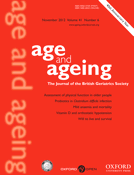
AGE AND AGEING
Leading Insights into Aging and HealthAGE AND AGEING is a premier peer-reviewed journal published by Oxford University Press, dedicated to advancing the field of gerontology and related medical disciplines. With its ISSN of 0002-0729 and E-ISSN 1468-2834, the journal has established itself as a critical platform for disseminating innovative research since its inception in 1972. It boasts impressive rankings within the Q1 category in Aging, Geriatrics and Gerontology, and Miscellaneous Medicine, reflecting its influential position in the scientific community. Researchers and practitioners alike value the journal's focus on the clinical, biological, and social aspects of aging, providing a multidisciplinary approach essential for addressing the challenges of an aging population. The journal maintains a significant impact factor, demonstrating its contribution to scholarly communication and knowledge dissemination. Although it does not operate under an open access model, AGE AND AGEING remains an essential resource for those committed to understanding the complexities of aging and enhancing the quality of life for older adults.
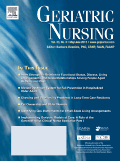
Geriatric Nursing
Fostering knowledge and innovation in geriatric nursing.Geriatric Nursing is a premier peer-reviewed journal dedicated to advancing the field of gerontology and nursing care for older adults. Published by MOSBY-ELSEVIER, this esteemed journal holds a significant place in the academic community with its Q2 ranking in both Gerontology and Medicine (miscellaneous) as of 2023, reflecting its importance and influence in the study and practice of healthcare for the elderly. With a comprehensive coverage extending from 1980 to 2024, Geriatric Nursing addresses the latest research, clinical practices, and policies impacting geriatric care, making it an essential resource for researchers, practitioners, and students alike. Although it does not provide open access options, its rigorous content garners attention with a Scopus Rank of #14 out of 39 in Nursing and Gerontology, placing it in the 65th percentile for its field. For those dedicated to improving the health and wellbeing of older populations, Geriatric Nursing remains a critical platform for innovation and knowledge dissemination.
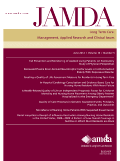
Journal of the American Medical Directors Association
Leading the charge in age-related health innovation.The Journal of the American Medical Directors Association, published by Elsevier Science Inc, stands as a leading publication in the fields of Geriatrics, Gerontology, Health Policy, and Nursing. With an impressive track record since its inception in 2001, this journal features cutting-edge research and critical reviews that address the multifaceted challenges affecting older adults and the professionals who serve them. Holding a Q1 ranking in multiple categories, including Geriatrics and Gerontology, it boasts an outstanding reputation within the academic community, reflected in its Scopus rankings—#3 in General Nursing and #7 in Geriatrics and Gerontology. This journal not only disseminates vital knowledge but also aims to influence policy and clinical practice, making it an essential resource for researchers, healthcare professionals, and students dedicated to improving care for the aging population. Although it operates under a subscription model, the journal ensures that its curated content continues to advance the understanding and management of age-related health issues.

Geriatrics
Uncovering the complexities of aging with impactful research.Geriatrics is a leading academic journal committed to advancing the understanding and research within the expansive field of gerontology and geriatric medicine. Published by MDPI since 2016 and featuring an Open Access model, this journal aims to disseminate high-quality research that addresses the challenges and opportunities associated with aging populations. Based in Switzerland, Geriatrics has rapidly gained recognition, achieving notable rankings in various categories such as Q2 in Gerontology and Q3 in both Aging and Geriatrics and Gerontology, making its contributions significant within the scholarly community. The journal welcomes original articles, reviews, and case studies, focusing not only on clinical aspects but also on social science perspectives related to health. Researchers and professionals in the field will find this journal a vital resource for the latest insights and trends that are crucial to improving elderly care and enhancing quality of life for aging individuals globally. With its commitment to open access, Geriatrics ensures that crucial research findings are readily available to all stakeholders, thus promoting informed dialogue and collaboration across disciplines.

ZEITSCHRIFT FUR GERONTOLOGIE UND GERIATRIE
Innovating research for healthier ageing.ZEITSCHRIFT FUR GERONTOLOGIE UND GERIATRIE, published by SPRINGER HEIDELBERG, is an authoritative journal dedicated to advancing the field of geriatrics and gerontology. With its ISSN 0948-6704 and E-ISSN 1435-1269, this journal has been a significant source of scholarly articles since its inception in 1995, catering to researchers and practitioners amid the growing importance of ageing studies. While it currently holds a Q4 ranking in Geriatrics and Gerontology and a Q3 ranking in Gerontology and Social Sciences, its contribution spans vital topics related to health ethics and legal aspects—reflecting a comprehensive view of the challenges faced in elder care. Although it is not an open-access journal, its rigorous peer-review process ensures that the research published is of high quality and relevance. Based in Heidelberg, Germany, the journal aims to foster discourse and disseminate crucial research findings that impact the health of elderly populations, making it an essential resource for researchers, healthcare professionals, and students devoted to improving geriatric care and understanding the complexities associated with ageing.
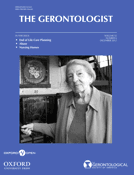
GERONTOLOGIST
Advancing the Science of AgingThe GERONTOLOGIST, published by Oxford University Press Inc, is a premier journal in the field of geriatrics and gerontology, with a distinguished history since its inception in 1961. This esteemed journal stands out with its impressive Q1 rankings in prominent categories, including Geriatrics and Gerontology, reflecting its vital role in disseminating innovative research and advancing knowledge within these critical disciplines. With an impact factor that ranks it among the top journals in both Nursing Gerontology and Medicine, the GERONTOLOGIST serves as a key resource for researchers, professionals, and students dedicated to enhancing the health and well-being of older adults. Although it operates under a traditional access model, the journal remains committed to publishing cutting-edge studies that address the complexities of aging and inform evidence-based practices. By fostering a rich dialogue among scholars and practitioners, the GERONTOLOGIST is instrumental in shaping the future of gerontological research and policy.

Aging Medicine
Pioneering Research in Gerontology and GeriatricsAging Medicine, published by Wiley, is a pivotal open-access journal that has been at the forefront of research dedicated to the aging population since its inception in 2018. With a focus on both geriatric care and gerontology, the journal serves as a crucial resource for researchers, healthcare professionals, and students interested in understanding the complexities of aging and the related medical challenges. Although it holds a Q3 quartile ranking in the fields of Aging and Geriatrics and Gerontology according to the 2023 metrics, the journal continues to effectively disseminate valuable research and insights, helping to bridge gaps in knowledge and practice. With an E-ISSN of 2475-0360, it offers an open-access model that ensures broader accessibility to its published content, thus promoting collaboration and innovation across disciplines. As the journal converges towards 2024, it remains committed to evolving with the dynamics of aging research, making it a significant platform for the exchange of ideas and advancements in this essential field.

Gerontology and Geriatric Medicine
Connecting global scholars to the future of elderly care.Gerontology and Geriatric Medicine is a distinguished journal published by SAGE Publications Inc, focusing on the vital field of gerontology and geriatrics. With an impressive Q2 ranking in Geriatrics and Gerontology as of 2023, this journal serves as a crucial platform for disseminating high-quality research and innovation related to aging and elderly care. Since embracing an Open Access model in 2015, it has broadened its reach, enabling scholars, researchers, and practitioners worldwide to access valuable insights without barriers. The journal’s scope encompasses a variety of interdisciplinary studies that address the multifaceted aspects of geriatric medicine, making it an essential resource for anyone dedicated to advancing knowledge and practices in this critical domain. With its commitment to enhancing the understanding of aging populations, Gerontology and Geriatric Medicine is poised to contribute significantly to the ongoing discourse and research developments in the care for older adults.
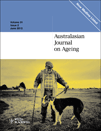
AUSTRALASIAN JOURNAL ON AGEING
Advancing knowledge for healthier ageing.Australasian Journal on Ageing, published by Wiley, is a leading academic journal dedicated to advancing the understanding of ageing processes and promoting health and well-being in older populations. With an ISSN of 1440-6381 and E-ISSN 1741-6612, this journal serves as a vital resource for researchers and practitioners in the fields of Community and Home Care, Geriatrics and Gerontology, and broader Medical disciplines. Since its inception in 1998, the journal has showcased high-quality research and innovative approaches to the challenges of ageing, as evidenced by its Q2 and Q3 rankings across relevant categories in 2023. With a focus on practical implications and interdisciplinary collaboration, the Australasian Journal on Ageing is instrumental in shaping policies and practices that enhance the quality of life for older adults. Notably, it is ranked highly in the Nursing community and maintains a strong position in geriatric research, making it an essential outlet for scholarly work that influences real-world outcomes.

Journal of Population Ageing
Advancing Knowledge on Population AgeingThe Journal of Population Ageing, published by SPRINGER INT PUBL AG, stands as a prominent platform for the exploration and dissemination of research within the fields of demography, geography, and sociology. With an ISSN of 1874-7884 and an E-ISSN of 1874-7876, this journal navigates the complexities of population ageing, a vital topic as societies worldwide confront the implications of an ageing demographic. The journal boasts impressive Scopus rankings, including the 30th rank in Demography and a 78th percentile in Sociology and Political Science, emphasizing its significant role in academic discourse. It is highly regarded in its Q2 category quartiles for Demography, Geography, Planning and Development, and Sociology and Political Science, showcasing its relevance and scholarly impact. Although not an open-access publication, the journal's carefully curated articles aim to inform and advance knowledge, making it an invaluable resource for researchers, professionals, and students invested in understanding the multifaceted challenges associated with an ageing population. With its comprehensive scope and commitment to quality, the Journal of Population Ageing continues to contribute meaningfully to the evolving conversation on demographic trends and their societal implications.